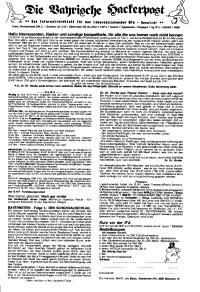Copy Link
Add to Bookmark
Report
Atari Online News, Etc. Volume 11 Issue 42

Volume 11, Issue 42 Atari Online News, Etc. October 16, 2009
Published and Copyright (c) 1999 - 2008
All Rights Reserved
Atari Online News, Etc.
A-ONE Online Magazine
Dana P. Jacobson, Publisher/Managing Editor
Joseph Mirando, Managing Editor
Rob Mahlert, Associate Editor
Atari Online News, Etc. Staff
Dana P. Jacobson -- Editor
Joe Mirando -- "People Are Talking"
Michael Burkley -- "Unabashed Atariophile"
Albert Dayes -- "CC: Classic Chips"
Rob Mahlert -- Web site
Thomas J. Andrews -- "Keeper of the Flame"
With Contributions by:
To subscribe to A-ONE, change e-mail addresses, or unsubscribe,
log on to our website at: www.atarinews.org
and click on "Subscriptions".
OR subscribe to A-ONE by sending a message to: dpj@atarinews.org
and your address will be added to the distribution list.
To unsubscribe from A-ONE, send the following: Unsubscribe A-ONE
Please make sure that you include the same address that you used to
subscribe from.
To download A-ONE, set your browser bookmarks to one of the
following sites:
http://people.delphiforums.com/dpj/a-one.htm
Now available:
http://www.atarinews.org
Visit the Atari Advantage Forum on Delphi!
http://forums.delphiforums.com/atari/
=~=~=~=
A-ONE #1142 10/16/09
~ Mozilla Boosts Security ~ People Are Talking! ~ HP's New Laptop!
~ Help Twitter Fight Spam ~ Firefox's Test Build! ~ Acer Goes to #2!
~ The Most Heinous Hoaxes ~ "Got the Wrong Bob?" ~ Hacked Facebook Apps!
~ Dragon Age Update News! ~ Impulse Game Buyer? ~ Bigger HD for PS3!
-* Senators: No Net Neutrality! *-
-* Windows 7 - Don't Pay To Upgrade! *-
-* Facebook, Twitter Rise, MySpace Is Dipping *-
=~=~=~=
->From the Editor's Keyboard "Saying it like it is!"
""""""""""""""""""""""""""
According to the calendar, this is still mid-October, right? Took the
dogs out this morning, and was greeted by snow falling! It's been
"looking like snow" for a few days now, and it happened. This has been
one mixed-up year for weather; and I hate it! I'm not prepared for the
cold, much less snow. Where's our Indian Summer??!! <sigh>
So, the first week of bachelorhood has been kinda boring. Up early in the
morning, work, and then home to take care of the "kids". Too tired to do
much of anything later in the day, so my days have just been repeating
themselves. Day off, try and get some sleep! Exciting, right?! At least
my wife is having a good time on her cruise!
So, I'm going to listen to some web radio while I finish up this week's
issue. Not sure what excitement I'll find once everything has been
completed, but I'll try to find something!
Until next time...
=~=~=~=
PEOPLE ARE TALKING
compiled by Joe Mirando
joe@atarinews.org
Hidi ho friends and neighbors. I apologize for my absence last week, but I
was just starting my medication regimen, and at least one of them had me
dazed and droopy and mentally slower than usual....
So you can imagine what THAT was like. <grin>
Anyway, I find it humorous in a karmic sort of way that I'm having to deal
with the health care system now, after hammering for so long for the the
need to change the system.
Actually, that's not exactly true. I have no major complaint about the
system. We here in the United States probably have the most accessible,
most modern and up-to-date, most advanced health care facilities in the
world. It's how we PAY for it that I think is majorly screwed up.
The problem is that we still 'think' of health care the same way we did
when there was much less health care available. Of course, your chances
of hearing "there's just nothing we can do" were much, much greater then,
and they didn't have the diagnostic tools to see much of what was coming
in a lot of cases. There were no CT scanners, MRIs, Scanning PET scans or
any of the other gee-whiz contraptions we have today. And they all cost
money. Lots of money.
Our prescription drugs are another big reason we're having trouble. Even
with insurance, drugs can get very expensive. One thing I find
interesting is that there are 'programs' that offer certain drugs to
people at very low pricing. I've done a bit of research (admittedly not
as much as I could have), and it seems that several store chains, Walmart
among them, have instituted programs where a 30-day supply of many
prescription drugs can be purchased for $4.00.
Is the company taking a loss on these drugs? No. They're selling them at
cost or slightly above, using them as a device to get you into the store.
And there's nothing wrong with that. It's good advertising. Getting your
butt into the store not only raises the chances that you'll pick up your
odds and ends while waiting for your prescription, but that you'll also
have your non-discounted prescriptions filled there too.
So the store wins. But what about the drug companies? Well, it turns out
that they settle for making a small profit on these drugs and are quite
happy to have their generic (yes, these are all generic drugs, most of
them older meds) 'out there' and in wide distribution. So the drug
companies win too.
But how about the insurance companies? Oh, don't you worry your head
about them. THEY win too, since, if you have a deductible, it's almost
certainly more than $4.00, and you pay the bill anyway. If you DON'T have
a deductible (and if you don't, don't tell anyone, since you'll almost
certainly be beaten severely by an angry mob), the insurance company pays
the bill, but it's only $4.00, so what do they care?
NOW comes the interesting part. One of the prescriptions I have now is
available at both my local Walmart and my local grocery store's pharmacy
counter for $4.00 for a month's supply. Imagine that.
Of course, I didn't think about that at the time, so I had the
prescription filled at the 'regular' pharmacy. Both of my prescriptions
were $15.00. Of course you can probably guess what my co-pay is on
prescriptions, right? Yep. $15.00 a piece. That means that I've been
paying the insurance company for the privilege of watching them pressure
the pharmacies into charging certain amounts for certain drugs. Of
course, my coverage is "2-tiered", which means that I have a $15
dollar co-pay on most generic drugs (a large number of which are $15.00 or
less) and a $35.00 co-pay for brand-name or non-generic drugs. Fewer of
them are below the $35 co-pay, but that's okay, since most drugs
prescribed fall into the 'generic' category anyway.
But let's focus on my 2 prescriptions for the moment. Both generic, both
sold at the 'regular' pharmacy for $15.00. That's $15 out of my pocket.
Not a big deal, right? I mean, it's ONLY $15.00. And the insurance
company didn't have to fork over anything at all, so the insurance
companies, along with the store chains and the drug companies, are happy.
Then there's the consumer. In my case, I could go to Walmart or my
grocery store (probably the grocery store, since I don't like a lot of
Walmart's practices), and pay $4.00 a month for my blood pressure
medication (my cholesterol medication isn't covered under these programs)
instead of going to my 'regular' pharmacy and paying $15.00, and in
neither case having the insurance company pick up any of the tab.
Now, is it a BAD thing that the insurance company doesn't have to pay
anything in these circumstances? No. What the heck, they're just like
everyone else who wants to save a bunch wherever they can, right?
So to recap: The drug companies make these generics available at a low
price to the chain stores, who use it as a tool to get more of your
business and the insurance companies are glad that you're happy as hell
to be paying out of your own pocket for it. So everyone's happy.
Well, not exactly. There's still the original pharmacy... you know, the
one that we just left in the dust?... The one where they have to charge
you the $15.00 for a $4.00 prescription. I doubt they're too happy about
it.
Now, the pharmacy I usually use isn't a small, old-fashioned mom-and-pop
shop, it's another chain. They, unfortunately, don't have a "$4.00
Program". They could, I suppose, but then who would be left to charge
"regular" prices to make the discounts look good.
Imagine that! EVERYONE selling common prescriptions for $4.00... and
everyone making a profit at it! Nahhhhhhhhhhhhhh, it'd never work. [grin]
Well folks, that's it for this time around. Tune in again next week, same
time, same station, and be ready to listen to what they are saying when...
PEOPLE ARE TALKING
=~=~=~=
->In This Week's Gaming Section - Bigger Hard Drive for PS3!
""""""""""""""""""""""""""""" Dragon Age Character Creator!
Are You an Impulse Game Buyer
=~=~=~=
->A-ONE's Game Console Industry News - The Latest Gaming News!
""""""""""""""""""""""""""""""""""
Sony To Launch PlayStation with Bigger Hard Drive
To give more room for game, movie and music downloads, Sony is launching
a PlayStation 3 with a larger hard drive on Nov. 3.
The $350 gaming console will have a 250 gigabyte hard drive, more than
twice as big as the recently launched slimmer, lighter PlayStation 3.
That one costs $300 and has a 120 gigabyte hard drive. Other than the
hard drive size, the new PS3 will look and work the same as the 120
gigabyte system.
Sony's move comes as game companies gear up for the holiday season, when
they reap most of their profit for the year.
BioWare's Dragon Age Origins Character Creator Released
"Servers are melting," blogs BioWare, but if you want to fiddle with Dragon
Age Origin's character creator, you can try your luck downloading it now.
The actual creator, that is, as seen in the game itself when it ships for
PC and Xbox 360 on November 3rd (PS3 owners have to wait until
November 17th for some reason).
Pull the character creator down - all 318 MB of it - and you can roll a
city elf, dwarf commoner, human noble, etc. a few weeks early, save
it to your hard drive, then use it in the game itself. Obsess now, so
you don't have to later!
Character Creator grab spots (sorry console buffs, PC gamers only):
Atomic Gamer
FilePlanet
Want a "bonus...exclusive in-game item"? Upload your character to
BioWare's new Social Network and "come Nov 3, get ready to slip on The
Lucky Stone."
This old stone, set in a golden ring, has been an aid and companion to
dozens of adventurers across innumerable years. Its trip to Ferelden was
long and convoluted. Some say it has a life of its own./
Stats:
~ Adds +1 to all all stats.
Are You an Impulse Game Buyer?
What gets you to buy a video game? Reviews? Punditry? A friend's
recommendation? Message board prattle? Previews? Developer diaries?
Carefully assembled personal research?
Or is it occasionally something more impulsive?
It's the latter for 40 percent of Canadians, according to an NPD Group
study that found 26 percent of gamers aged 13 to 27 and 24 percent aged
35 to 44 purchased a game on impulse at least once in the last six months.
The study's not quite as sensational as it sounds: While NPD says the
number indicates an increase in impulse buys, it doesn't mean impulse
purchases account for 40% of *all* game sales, but it does indicate
Canadian gamers are increasingly inclined to buy games on the spur of
the moment despite wavering economic and employment indices.
The study also appears to indicate those impulse purchases leaned toward
used games. Of the total 2,429 gamers (including 1,758 adults and 371
teens) sampled, a third said they'd purchased at least one used game in
the last six months. The average impulse purchase price was CAD $27,
compared to CAD $43 for planned purchases. Used game sales remains
predominantly retail store based, which jibes with the study's
indication that only 15 percent of impulse purchases occurred online.
"Clearly gamers are becoming much less reluctant to spend on games,"
said NPD Group's Matthew Tattle. "One would think it is a little unusual
to see impulse purchases during a recession but it's clear that hardcore
gamers will find a way to satisfy their need for something new,
different and enjoyable."
=~=~=~=
A-ONE's Headline News
The Latest in Computer Technology News
Compiled by: Dana P. Jacobson
Companies, Lawmakers Tell FCC to Dump Net Neutrality
As the U.S. Federal Communications Commission moves toward developing
formal net neutrality rules, some U.S. lawmakers and telecom-related
companies have told the agency that new regulations will cause more
problems than they're worth.
FCC Chairman Julius Genachowski announced last month that he would seek
to develop formal rules prohibiting Internet service providers from
selectively blocking or slowing Web content and applications. On Oct.
22, the commission is scheduled to vote on a notice of proposed
rulemaking for net neutrality rules, the first step toward developing
those regulations.
But 44 companies sent a letter, dated Wednesday, to the FCC saying new
regulations could hinder the development of the Internet.
"Until now, the innovators who are building the Internet and creating
the advancements in telemedicine, education and the vast array of other
online products and services have done so in an environment driven by
competition and innovation," said the letter, signed by Cisco Systems,
Alcatel-Lucent, Corning, Ericsson, Motorola and Nokia. "We believe
government's role in the Internet should be to support investment, jobs
and new technologies, especially if they increase the opportunity for
all Americans to connect online."
Instead, new net neutrality rules could prohibit broadband providers
from offering advanced and well-managed networks, the companies said.
"Public policy should encourage more investment to expand access to the
Internet, whether it is access through a cell phone, a laptop, a PC or
any new device that we have yet to imagine," the letter said. "If the
FCC takes a prescriptive approach to new regulations, then it could
place itself in the position of being the final arbiter of what products
and services will be allowed on the Internet."
A day earlier, a group of 18 Republican U.S. senators also sent a letter
to Genachowski raising concerns about net neutrality regulations.
Broadband is growing while other segments of the U.S. economy are
struggling, and there have been only a couple of examples of broadband
providers blocking or slowing Web content, said the letter, spearheaded
by Senator Sam Brownback, a Kansas Republican.
"When the government picks winners and losers in the marketplace, the
incentive to invest disappears," the letter said. "We fear that the
proposals you announced ... will be counterproductive and risk harming
the great advancements in broadband speed and deployment that we have
witnessed in recent years and will limit the freedom of the Internet."
Net neutrality backers say new rules are necessary to protect the open
nature of the Internet. The FCC in 2005 relaxed rules requiring network
providers to share their networks with competitors and without a net
neutrality rule, powerful, large broadband providers could shut out Web
sites or applications, net neutrality advocates say.
Net neutrality rules would protect innovators and small businesses that
want equal access to broadband networks from large companies that can
enter into deals with network providers, said Art Brodsky,
communications director for Public Knowledge, a digital rights advocacy
group.
Since 2005, the FCC has enforced a set of net neutrality principles on a
case-by-case basis, but it has never made formal regulations. Broadband
provider Comcast filed a lawsuit challenging the FCC's authority to
enforce the principles after the agency ruled in August 2008 that
Comcast had to stop slowing peer-to-peer traffic in the name of network
management.
Broadband providers and others opposed to net neutrality are engaged in
a coordinated effort to stop the FCC effort in its tracks, Brodsky said.
Arguments that net neutrality rules will stop telecom investments in
networks are "nonsense and insulting," he said. "All [some] industries
do is threaten and bully. It's like they're saying, 'If we don't get
what you want, then you're not going to get your network.'"
Telecom providers operated under network neutrality-like rules for more
than 70 years and investment continued, Brodsky said.
Telecom providers and their allies "have all the resources, Democrats
and Republicans, that they've traditionally called upon, and it will
obviously be incumbent on those of us who want a free and open and
nondiscriminatory Internet to make the case," he added.
Help Twitter Fight Spam
Twitter has had its share of problems with spam. Fraudulent IDs, worms,
you name it ... and it's just getting worse.
Before now, users could fight back using a few helpful steps or reporting
profiles to an @spam mailbox. Now Twitter has introduced a handy tool to
combat the raging army of spam.
When browsing a user's page, click on the actions toolbar located at the
top right-hand corner of the feed. At the bottom of the drop-down menu
you'll see "Report /so-and-so/ as spam." A report then goes to Twitter's
Trust and Safety team, which will investigate the claim. Even better:
Twitter's new antispam tool also works as an antistalker device, as any
profile you report is then barred from following or replying to you.
That's all fine and well, but the antistalker measure leads me to think
that perhaps some people will abuse this feature. Sick of reading your
boss's son's emo tweets about his feelings? Report him. Exhausted from
replies about that time you split your pants at the bus station? Report
them. If this reporting tool gets out of hand -- which may not be the
case at all -- the Trust and Safety team will certainly have its share
of work to do investigating profiles that aren't actually spam but
rather obnoxious gabbers.
Still, the report spam option on Twitter is a welcome addition to the
site, and one that will surely clean up the dregs for people who
actually want to enjoy themselves in 140 characters or less.
Facebook, Twitter Continue Rising; MySpace Dips
According to the most recent Hitwise survey, Facebook has seen an
impressive bump in traffic versus this time last year.
For September 2009, the site claimed 58.6 percent of U.S. social
networking tracking, a jump of 194-percent over the same period last
year. Twitter's increase, meanwhile, was downright absurd, jumping 1,170
percent over the past year.
Of course, it must be noted that Facebook was already rather well
established this time last year, but the jump is quite impressive; in
September 2008, Facebook recorded a 19.94 share, which increased to
58.59 percent for Sept. 2009. MySpace, by contrast, dominated the
social-networking sites last September, with a 66.8 percent share. Since
then, however, MySpace's market share has plunged to 30.3 percent, still
leaving it second in U.S. traffic.
MySpace, however, still claims the lead in the coveted 18-24 age
demographic, with 32.2 percent versus 27 percent for MySpace. Hitwise
recorded a shift, however, with a 13 percent drop in the demographic for
MySpace and a 10 percent increase for Facebook.
Twitter, by contrast, ranks fourth, behind Tagged.com. Last year, Twitter
only represented 0.15 percent of the U.S. social networking space, growing
to 1.84 percent for Sept. 2009. MyYearbook.com rounds out the top five.
However, more time is spent on MySpace than on Facebook, Hitwise found:
25 minutes 56 seconds, on average. That's a drop of about three and a
half minutes from the same period last year. Users spend 23 minutes on
Facebook. Although Tagged.com ranks far behind both Facebook and MySpace
in visits, the site still ranks second in time spent, with 25 minutes 17
seconds spent. For all of its enforced brevity, Twitter ranks fifth,
with 15:52 spent per visit, a drop of 56 percent since last year.
Windows 7 Strong, But Don't Pay To Upgrade
Next week, Microsoft is releasing Windows 7, a slick, much improved
operating system that should go a long way toward erasing the bad
impression left by its previous effort, Vista.
If you've been holding off on buying a new computer, Windows 7 will be a
good excuse to get back into the game. And if you've been weighing a Mac
versus a Windows PC, then you should know that "7" makes Windows more
attractive, though not a clear-cut choice for everyone. Windows is now
easier to use and better looking than it was before, while maintaining
its core advantage of cheaper, more diverse hardware.
However, most PC users should not take the release of Windows 7 as a
call to action, or feel that they have to run out and buy the software
for use on a computer they're planning on keeping. The upgrade will most
likely not be worth the time or money, much less the effort of hosting a
Windows 7 "launch party" as Microsoft suggests.
Windows 7 will come in several versions. The one aimed at U.S. consumers
is Home Premium, which will cost $120 if bought as an upgrade to XP or
Vista. You can buy it as a download or on a disc. Beginning on Oct. 22,
it will come installed on new PCs.
Here are some of its highlights:
* The taskbar - the strip of icons usually found at the bottom of the
screen - now does more than show which programs are running. You can
also stick icons for your favorite programs on it, to launch them
quickly. It's fast and convenient, combining the best features of the
old Windows taskbar and Apple's Dock.
* File folders can now be organized into "libraries." You can have a
photo library, for instance, that gives you quick access to pictures in
folders spread out over your hard drive, or even several hard drives.
This is great because many applications don't automatically put files
into Microsoft's My Documents and My Photos folders, and tend to deposit
content in their own folders. The new arrangement also makes for easy
backups.
* Like Vista, Windows 7 will ask you twice if you really want to make
changes to your settings or install programs, for the sake of security.
But Windows 7 does it less often, and the prompts can be turned off.
* Windows 7 can sense if you use more than one finger on your touch pad
or touch screen, allowing for neat tricks such as spreading your fingers
to zoom into a picture, just like on the iPhone. This is isn't
revolutionary per se - computer manufacturers have bolted multitouch
sensing on previous versions of Windows. But it does make it easier for
them to include advanced touch capabilities, and many of them are
planning to do so. That is what could really revolutionize how we use
computers. I've tried laptops and desktops with touch screens, and found
it nice to be able to directly tap links and buttons, bypassing the
touch pad and mouse.
* For a lot of users, the step up to Windows 7 will also mark a
transition to a 64-bit operating system. That means computers will now
be able to use a lot more Random Access Memory, or RAM, for better
performance in demanding applications such as video editing. Vista and
XP came in 64-bit versions in addition to the regular 32-bit versions,
but the XP version was never popular, and the Vista version became
mainstream only last year. But 64 bits will be standard on Windows 7,
installed on nearly all new computers.
Windows XP users have a lot more to gain by going to Windows 7. Vista
introduced some great features, such as fast searches of the entire hard
drive, that of course are present in 7 as well. Unfortunately, upgrading
an existing PC from XP to 7 is not easy.
After upgrading, users will have to reinstall all their programs and
find their files in the folder where Windows 7 tucks them away.
They may also have hardware problems. I found an old HP laser printer no
longer worked with Windows 7. This isn't really Microsoft's fault or,
specifically, a problem with the new operating system - HP just doesn't
provide a 64-bit driver for that printer. A driver is a program that
tells a piece of hardware how to work with an operating system.
If you do upgrade, I would still recommend tackling that transition
head-on by installing the 64-bit version of Windows 7, which doesn't
cost more. Microsoft recommends a minimum of 2 gigabytes of RAM to run it.
If your computer runs Windows Vista, I think it's hard to justify
spending $120 for an upgrade. The new features are nice but hardly
must-haves. For daily e-mail and Web surfing, they won't make much of a
difference. Vista was much maligned when it arrived in early 2007 for
being slow, buggy and annoying. Now, it really isn't that bad, because
updates have fixed a lot of the problems.
However, if you bought a Vista-based computer after June 25, you should
be eligible for a free upgrade to Windows 7 from the manufacturer, and I
suggest taking advantage of it. Your computer likely already is running
64-bit software, so there should be no problems with drivers, and the
upgrade is much easier than one from XP. Windows 7 can keep your
installed programs and your files in their old folders.
In weeks of testing the final version of Windows 7 on five computers, I
encountered only one serious glitch. The backup function simply didn't
work on one computer. The error message was obscure as always, and
troubleshooting on Microsoft's Web site provided no solution. I ended up
using third-party backup software. Given that regular backups are
essential for a home computer, one can only hope that this will be an
unusual problem that gets fixed promptly.
Another disappointment is that Windows 7 doesn't seem to improve boot-up
times. In my tests, it took slightly longer to get going on Windows 7
than with XP or Vista on the same computer. I don't think this should be
a major issue, though - instead of shutting your computer down, use
"sleep mode" instead. This function has improved a lot since XP, and
most computers take about 10 seconds to wake up.
Perhaps the most exciting thing about Windows 7 is that it's inspiring
computer manufacturers to try new things, and reviving old ideas like
touch-enabled "tablet" PCs. It's breathing new life into the computer
market. It just won't do much for old clunkers.
To Boost Security, Mozilla Launches Plugin Checker
Mozilla developers have launched a new online tool that tells Firefox
users whether popular add-on components such as Java or QuickTime are up
to date.
The new Plugin Check page tests for more than 15 popular plugins right
now, and Mozilla plans to add more in the future. "Visitors to the page
can see which plugins they have installed and, for any that are outdated,
follow an easy link to the update site," wrote Mozilla's "human shield,"
Johnathan Nightingale in a Tuesday blog posting.
A test version of the site was introduced last week. The final page
tests for plugins such as Silverlight, Picasa, iTunes and Acrobat.
Firefox can already check to make sure that add-ons, installed through
the addons.mozilla.org Web site, are up to date. But this can't be done
with the plugin software targeted by the new Web page, Nightingale said in
an e-mail interview. "Plugins like RealPlayer, Flash or Silverlight are
pieces of software installed on your machine outside of Firefox's
control," he said. "They interact with Firefox, but they are independent
software packages, and make their own choices about when and how to
update."
Keeping plugins up-to-date is becoming increasingly important. Mozilla
says that about 30 percent of browser crashes are caused by obsolete
plugins. Besides that annoyance, however, they also pose a security
risk. That's because out-of-date plugins are increasingly exploited by
hackers in Web-based attacks that place malicious software on the
victim's computer. Flaws in Adobe's Flash and pdf formats, Apple's
QuickTime, and RealPlayer have all been widely exploited in this way in
the past few years.
Security conscious Firefox users can use the Plugin Check site for now,
but the checks will be built into the upcoming Firefox 3.6 browser,
expected by year's end Nightingale said. That should help keep many more
Firefox users up-to-date.
"We can't control how plugins choose to update themselves," he said.
"But we can help our users to know when an update is available."
After criminals launched widespread attacks based on a flaw in Adobe's
Flash player earlier this year, Mozilla built an automatic Flash checker
into its browser. Within days of its release last month, 10 million
Firefox users had clicked through to Adobe's Web site after being
alerted that their Flash player needed an upgrade.
HP's New Touch Screen Laptop and All-In-Ones Debut
HP is taking touch to the people, with new touch screen laptop and desktop
models, all featuring Windows 7 and some shipping on Oct. 22, when the new
operating system is formally introduced.
The new multi-touch models include a number of applications that take
advantage of the interface, including Hulu, Netflix, Pandora, Recipe
Box, a webcam "photo booth" application, and the HP Music Store.
* HP TouchSmart tx2 - A laptop, starting at $799, with a 12.1-inch
screen that rotates 180-degrees for use as a tablet. Besides touch
commands, users can write or draw on the screen with an electronic
pen. Available Oct. 22.
* HP TouchSmart 300 and 600 - Are the third-generation of HP's
touch-enabled desktops. The 300 has a 20-inch screen and the 600
(shown) has a 23-inch display. The 300 starts at $899 and will
begin deliveries on Nov. 1, with the 600 due Oct. 22 and priced
starting at $1,049.
* HP TouchSmart 9100 - An all-in-one desktop, starting at $1,299,
which includes a 23-inch touch screen. It can be used as standard
touch screen PC or tasked as a map or events kiosk in an office,
hotel, or other location. Deliveries begin in December.
* HP LD42200tm - A digital signage device with a 42-inch touch
screen. Available in December for $2,799.
Besides touch screens, HP also introduced several business desktop and
laptop computers as well as new value-oriented Compaq-branded desktops and
a laptop.
The Compaq Presario CQ61z (where do they get these model numbers?) costs
only $399 and features a 15.6-inch screen, after $100 instant rebate.
The Compaq 500B business desktop sells for $359, while the new Compaq
Presario 4010f desktop sells for $309.
My take: The laptop looks very interesting and I will consider
purchasing one during my next upgrade cycle. I am not wild about
reaching out to touch a desktop, although HP is pushing these models for
entertainment and kitchen use, where touch makes some sense.
In the kitchen, the touch screen is meant to be used with recipes and
other applications that can work entirely by touch when keyboard use
isn't appropriate. Verbal directions are also provided.
The new Compaq's are a welcome addition to lowest-priced laptops and
desktops. The laptop competes with netbooks on price and will win some
of those battles.
Firefox 3.6 Beta 'Test Build' Available For Download
Mozilla today released the first beta of the next iteration of their
Firefox browser, version 3.6. Word broke earlier last week with details
that 3.6, codenamed Namoroka, would finally be leaving Alpha status, and
being made available for download ahead of the full stable release, which
is currently expected to appear sometime next month.
However, despite 3.6's current availability, Mozilla's Patrick Finch has
since clarified that the "beta programme for Firefox 3.6 has not yet
launched", detailing that the version available on the companies servers
is just a "test build".
So for those of you planning on taking the experimental beta plunge, a
host of new features will great you, including:
* Use of the 1.9.2 Gecko Engine - Faster page rendering.
* Tab previews - Use CTRL and Tab to quickly switch between tabs.
* Thumbnail taskbar previews - An option available to Windows 7 users.
* Automated Plug-In Checker - Firefox will now automatically check
for outdated plug-ins
* JavaScript - Improvements in handling JavaScript.
One such feature, although promised for version 3.6, which is lacking
from this test build is the recently announced orientation detection.
This new feature gives Firefox the power, when available, to detect the
orientation of a device and change the position of the on-screen data.
You can download the test build of the Firefox 3.6 Beta now, and according
to some reports you may see an overall improvement in performance of up to
23%.
Netbooks Drive Acer to #2 PC Vendor in World
A whopping 26 percent increase in unit sales pushed Acer ahead of Dell
in global PC sales, with Acer achieving the runner-up position for the
first time.
IDC released its third-quarter PC estimates on Wednesday, placing
Taiwan's Acer in the number-two spot. Dell suffered an 8.4 percent drop
in unit shipments, IDC reported, the only vendor in the top five
worldwide to record lower overall unit sales on a worldwide basis.
Dell's U.S shipments declined as well.
Within the United States, however, Dell handily maintained its position
as the second-ranked PC vendor. HP retained the top spot, in both
worldwide and U.S. shipments, but just edged out Dell within the U.S.
Overall, global PC shipments rose by 2.3 percent to 78.1 million units,
in what IDC called "an important continuation of recovery from
year-on-year declines of 6.8 percent in the first quarter and 2.4
percent in the second quarter."
"Despite the ongoing mix of gloom and caution on the economic front, the
PC market continues to rebound quickly," said Loren Loverde, program
director for IDC's Tracker Program, in a statement. "The competitive
landscape, the transition to portables, new and low-power designs,
growth in retail and consumer segments, and the impact of falling prices
are all reflected in the gains by HP and Acer, as well as overall market
growth."
Acer capitalized on the craze for netbooks and low-cost notebooks, and
IDC said that the company outperformed in all regions.
Worldwide, HP sold 15.8 million units during the third quarter, a 9.3
percent increase versus the same period a year ago. HP's worldwide PC
market share is 20.2 percent, IDC found. Acer sold 10.96 million PCs, an
increase of 25.6 percent, while Dell sold 9.96 million PCs, a dip of 8.4
percent that placed Dell in third. Overall, Acer's market share is 14.0
percent worldwide, while Dell now stands at 12.7 percent. Lenovo and
Toshiba retained their fourth and fifth-place rankings, both recording
positive growth and finishing the quarter at 8.9 percent and 5.2
percent, respectively.
Within the U.S., HP also saw growth, but at a much flatter 3.2 percent
clip, selling 4.47 million PCs or 25.5 percent of the market. Dell's
year-over-year sales also dipped by 13.4 percent to 4.37 percent,
finishing at 25.0 percent.
Acer ranked third within the U.S., capturing 11.1 percent of the U.S.
market, while Apple recorded a 9.4 percent share. Acer sold 1.95 million
PCs, up a whopping 48 percent versus a year ago, while Apple sold 1.64
million PCs, up 11.8 percent. Toshiba's unit sales climbed 37.4 percent
to 1.43 million units, but that was good for just 8.1 percent of the
market, as the top five vendors stole market share from smaller rivals.
"With the forthcoming launch of Windows 7 and expected commercial
refresh beginning in 2010, the prospects for future PC market growth are
very solid," Bob O'Donnell, the vice president of clients and displays
at IDC, said in a statement.
Gmail Tool Catches Misdirected Messages
Google on Tuesday added an embarrassment-avoidance tool that catches
misdirected Gmail messages before they are fired off by users of the
free Web-based email service.
A feature playfully dubbed "Got the wrong Bob?" is designed to warn
people if it appears they may be about to send a Gmail message to an
unintended recipient, according to Google engineers Ari Leichtberg and
Yossi Matias.
"When's the last time you got an email from a stranger asking, 'Are you
sure you meant to send this to me?' and promptly realized that you
didn't?" Leichtberg and Matias asked in a joint blog post.
"Sometimes these little mistakes are actually quite painful. Hate mail
about your boss to your boss? Personal info to some random guy named Bob
instead of Bob the HR rep? Doh!"
The new feature from Google Labs can be turned on by modifying Gmail
Settings. The software identifies groups of people Gmail users most
often send messages to, and then alerts senders when they deviate from
patterns.
"Gmail will try to identify when you've accidentally included the wrong
person, before it's too late," the engineers said.
In the spirit of the new tool, Google has renamed a "Suggest more
recipients" feature to "Don't forget Bob."
Gmail goof-prevention tools include "Undo Send" that recalls freshly
sent email messages and "Mail Goggles" intended to thwart drunken
messaging by only sending late-night emails after basic math problems
are correctly answered.
Hacked Facebook Apps Lead to Fake Antivirus Software
New applications are turning up on Facebook. Unfortunately, some of them
are fake antivirus programs.
While researching Web sites that host malicious software, Roger
Thompson, chief research officer of software security company AVG,
noticed something funny. A Russian Web site known for hosting malware
was getting lots of referrals from Facebook.
On further investigation, Thompson found the referrals were coming from
a Facebook application called "City Fire Department," a game where
multiple players respond to emergency calls. The application had been
modified to deliver an iframe, which is a way to bring content from one
Web site into another.
The iframe serves up code that tries to exploit vulnerabilities in a
PC's software. If it finds one - a process that happens nearly
instantly - it then downloads a fake antivirus program called Antivirus
Pro 2010. Thompson posted screenshots on AVG's blog.
Bogus antivirus programs have been around for a long time, but they've
become an increasing nuisance this year as those who create them seemed
to have stepped up their game. When installed on computers, the programs
nag users to buy them. The applications, which can cost upwards of
US$60, are generally useless against real security threats.
Thompson thought the people who wrote City Fire Department might be
behind the scam. But the malicious code was actually hosted on Facebook,
which led Thompson to theorize that the developers of City Fire
Department inadvertently had their Facebook passwords obtained by a
hacker, after which the application was modified.
The password credentials could have been compromised through a phishing
scam, or a developer's PC could have been hacked. City Fire Department's
developers acknowledged a problem on Facebook on Thursday.
"The application has been taken offline until we can resolve all
issues," according to the post. "We understand the frustration some
users are feeling, and we will update with a timeline as soon as we can.
Obviously, we would rather have a properly functioning game running
instead of a half-working game."
Facebook has been notified. The social-networking site "certainly takes
security seriously, and they respond very quickly but the stuff that
comes out of left field is hard to defend against," Thompson said.
Three or four other applications had also been modified, Thompson said.
Facebook can deactivate the applications until they are cleaned up. The
situation also poses a danger to enterprises, who may allow their users
access to Facebook through their firewall, thus opening a vector to
deliver malware.
"The corporate firewall doesn't provide any security," Thompson said.
Facebook representatives could not be immediately reached for comment.
The Net's Most Heinous Hoaxes
Most online hoaxes are mildly annoying, and a few are hilarious. But
propagating a false AMBER Alert over Twitter? Plastering an epilepsy
forum with flashing images? Not cool. We'll take a look at some of the
Web's most heinous hoaxes over the years, and sprinkle in a handful of
amusing ones.
*Twitter/Facebook Amber Alert*
The AMBER Alert system - a child abduction alert system broadcast over
radio, TV, satellite radio, and other media whenever a child is
abducted - was created after nine-year-old Amber Hagerman was abducted
and murdered in Arlington, Texas, in 1996. Recently, some users have
also broadcast alerts over text messages and Twitter.
Last July, someone tweeted an AMBER Alert for a three-year-old girl.
People responded by spreading the alert as fast and as far as they
could. It turned out to be a false alarm. A similar sequence of panicked,
rapid-fire tweeting followed another false AMBER Alert occurred in
September.
How heinous is this? Though we're glad that no abduction occurred in
either case, there's a disturbing "cry wolf" aspect to the story - what
happens the next time a real AMBER Alert goes out? For eroding the value
of a potentially vital line of defense against child abduction, this
hoax sets the platinum standard for repugnance.
*Bonsai Kitten*
Paging PETA: In 2001, a group of enterprising MIT grad students put
together a little Web site called Bonsai Kitten, which detailed how to grow
a kitten in a jar for aesthetic purposes.
The site included tips on how to insert a feeding tube and a waste
removal tube, and where to drill air-holes "prior to kitten insertion."
It also included a gallery of pictures of "Bonsai Kittens" and a
guestbook filled with love (and hate) mail.
The site was so realistic that it caused uproar among kitty enthusiasts
and animal rights activists (including the Humane Society), and it
eventually gained enough notoriety that the FBI investigated the site's
authenticity (or lack thereof). But since no kittens were actually harmed
in the perpetration of this hoax, we think it tends more toward the
hilarious than the heinous.
*Epilepsy Forum Raid*
Anonymous, a group of online pranksters, has been blamed for an array of
notorious acts of Internet grief - from uploading porn on YouTube to
launching denial-of-service attacks on Scientology sites. Some of the
pranks they allegedly pulled are a bit more serious, however, such as the
Epilepsy Forum Raid.
In March of 2008, an epilepsy support forum run by the Epilepsy
Foundation of America was attacked with uploads of flashing animations.
The National Society for Epilepsy, based in the UK, fell prey to a
similar attack.
The animations - which were clearly intended to induce seizures and/or
migraines in epileptics - can be very dangerous for epilepsy sufferers.
The attack was investigated by the FBI, which found no connections to
the group Anonymous. Internet speculation has attributed the attack
variously to The Internet Hate Machine, to 7chan.org, or to eBaum's World.
*Bigfoot's Body*
Bigfoot is alive - okay, actually he's dead, and he's in a freezer in
Georgia. At least, that's what The New York Times and other major news
outlets reported on August 14, 2008.
In the finest "made you look" tradition, two men from Georgia announced
that they had found the body of Bigfoot and would present definitive
proof (in the form of photographs and DNA) that Bigfoot existed. In
fact, they revealed, they saw three other Bigfoots in the woods as they
were dragging the dead beast's body back to their car - possible evidence
that these creatures had mastered the intricacies of contract bridge but
had not yet learned to control their tempers over botched bidding.
Quasi-expert Tom Biscardi, an inveterate promoter of all things Bigfoot
(and perpetrator of his own Bigfoot hoax just three years prior),
vouched for the men.
How bad is this? Not surprisingly, the body turned out to be a costume
stuffed in a freezer. But an Indiana man fronted $50,000 on behalf of
Biscardi for the "body," and is now suing the pair of hoaxers to get his
money back. The most heinous part of this hoax is the fact that someone
actually fell for it.
*Changing the Value of Pi*
On April Fool's Day 1998, Mark Boslough wrote a fictional piece about
Alabama legislators calling on the state government to pass a law that
would change the value of pi from 3.14159... to the "Biblical value" of 3.
Boslough's titled his article "Alabama Legislature Lays Siege to Pi."
Though the piece was originally posted to a newsgroup, it ended up being
forwarded...and forwarded...and forwarded...
Alabama legislators began receiving letters from outraged scientists and
civilians, but that's about as dangerous as the situation got. The
funniest part of the hoax? It echoes an actual event: In 1897, the
Indiana House of Representatives passed a resolution to change the value
of pi to 3 - luckily, irrationality prevailed and the bill died in the
State Senate.
*Save Toby*
Taking a cue from Bonsai Kitten, a site called Save Toby used a creepy
premise to throw animal rights activists into a tizzy.
The Save Toby saga began in the early days of 2005, when the site
announced that its owners had found a wounded rabbit (which they named
Toby) and nursed it back to health - but then declared that if they did
not receive $50,000 in donations for the care of Toby by July 30, 2005,
they would be forced to cook and eat the rabbit.
The owners asserted that the site was not a hoax: They would, indeed,
cook and eat Toby if they did not receive the money. Animal rights
activists cried "animal cruelty," to which the owners responded that
they were doing nothing cruel to Toby - in fact, they were trying to save
him. Supposedly, the site collected more than $24,000 before Bored.com
bought it, and Toby was saved. (By the way, possible inspirations
from pre-Internet days for the Save Toby hoaxers aren't hard to find.)
But holding a bunny hostage for ransom? Real classy, fellas.
Nigerian money scams are so overexposed in the media these days that it's
hard to believe people still fall for them. Then again, the scammers send
out thousands of e-mail appeals every day in the hope of getting just one
gullible person to reply.
The scam itself is pretty simple: The grifter promises the randomly
chosen e-mail recipient an absurd amount of money to help the crook
"transfer funds" from one bank to another (or some variation thereof).
To help the con artist, all the victim has to do is provide his/her
personal information, bank information, and, oh yeah, a small fee
(around $200 - a small price to pay, considering the impending payoff) to
help transfer the money. If the scammee goes along, bam! The scammer
obtains all of the scammee's personal info, and a tidy little sum besides.
Not bad for one e-mail.
These scams can be life-threatening as well as costly. In some cases,
the scammers invite the victims to travel to Nigeria or a bordering
country to complete the transaction. In 1995, an American was killed in
Lagos, Nigeria, while pursuing such a scam. Truly horrific.
*Work-At-Home Scams*
Like the Nigerian money scams, work-at-home come-ons are heavily
reported in the media. Yet people still fall for them. Most people know
that if it sounds too good to be true, it probably is. But desperation
or greed makes some people forget.
Work-at-home scams promise you the opportunity to make quick, easy money
from the comfort of your house; all you need is a computer - which, of
course, you have. Any number of activities may be your ticket to
riches - stuffing envelopes, transcribing, medical billing - but first you
need to do send the scammer some money for preliminary materials.
Except, of course, that materials will never come, and you'll have lost
your money, and you still won't have a job.
Heinous? Such scams aren't life threatening, but they can certainly put
a dent in your savings - especially if you fall for them more than once.
And the fact that they prey primarily on unemployed or underemployed
people who aren't exactly swimming in discretionary income (it's hard to
imagine Warren Buffett jumping at the chance to make money by stuffing
envelopes) increases their vileness quotient at least a little.
Remember, if prospective employers ask you to send money before you
start working for them...it's probably a scam.
*Facebook Hoax on TechCrunch*
Guess you should stay on the good side of people who run your primary
social networking site. In September 2009, Facebook's PR went rogue and
punk'd TechCrunch with a "Fax This Photo" option.
TechCrunch reporter Jason Kincaid opened his Facebook on September 10,
2009, and discovered that under every photo there was a new option: "Fax
This Photo." It seemed ridiculous - but everyone in the TechCrunch
network saw it, so he sent an e-mail to Facebook. They didn't respond,
so he posted a skeptical note. He then called Facebook PR...and
discovered that it was all a big prank, and that Facebook staffers were
placing bets on how long it would be before TechCrunch posted it.
Heinous? Not at all. TechCrunch got PWN'd.
=~=~=~=
Atari Online News, Etc. is a weekly publication covering the entire
Atari community. Reprint permission is granted, unless otherwise noted
at the beginning of any article, to Atari user groups and not for
profit publications only under the following terms: articles must
remain unedited and include the issue number and author at the top of
each article reprinted. Other reprints granted upon approval of
request. Send requests to: dpj@atarinews.org
No issue of Atari Online News, Etc. may be included on any commercial
media, nor uploaded or transmitted to any commercial online service or
internet site, in whole or in part, by any agent or means, without
the expressed consent or permission from the Publisher or Editor of
Atari Online News, Etc.
Opinions presented herein are those of the individual authors and do
not necessarily reflect those of the staff, or of the publishers. All
material herein is believed to be accurate at the time of publishing.






















